Registered Nurse in Practice in Ireland
VerifiedAdded on 2023/05/31
|8
|1971
|283
AI Summary
This article discusses the roles and principles of registered nurses in delivering quality healthcare in Ireland. It highlights the ethical conduct and moral principles that guide their practice, including autonomy, nonmaleficence, beneficence, and justice. The Nursing and Midwifery Board of Ireland has stipulated nursing principles that must be adhered to by all registered nurses in Ireland. These principles ensure that patients are treated with humanity and dignity, and that their individual needs are fully understood and respected.
Contribute Materials
Your contribution can guide someone’s learning journey. Share your
documents today.
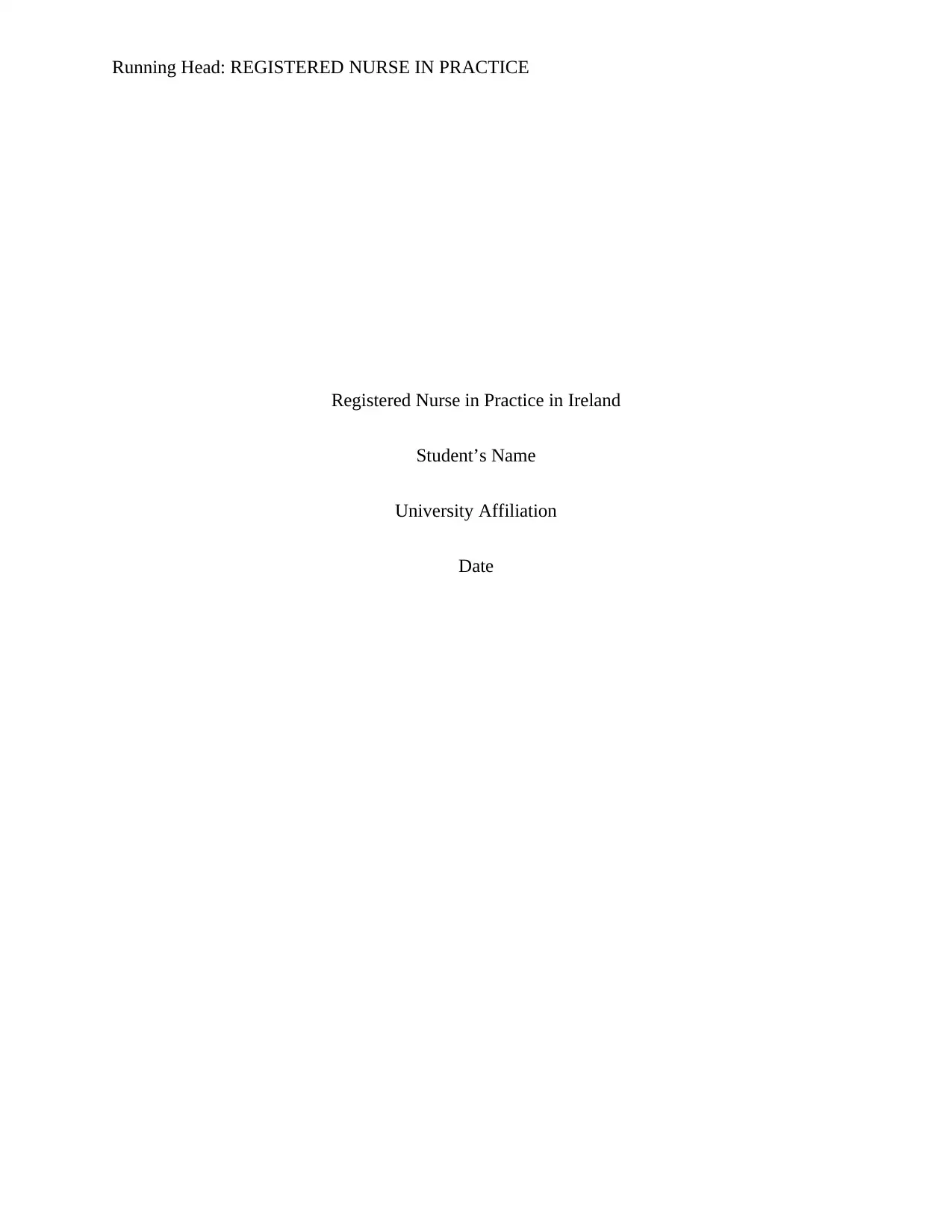
Running Head: REGISTERED NURSE IN PRACTICE
Registered Nurse in Practice in Ireland
Student’s Name
University Affiliation
Date
Registered Nurse in Practice in Ireland
Student’s Name
University Affiliation
Date
Secure Best Marks with AI Grader
Need help grading? Try our AI Grader for instant feedback on your assignments.
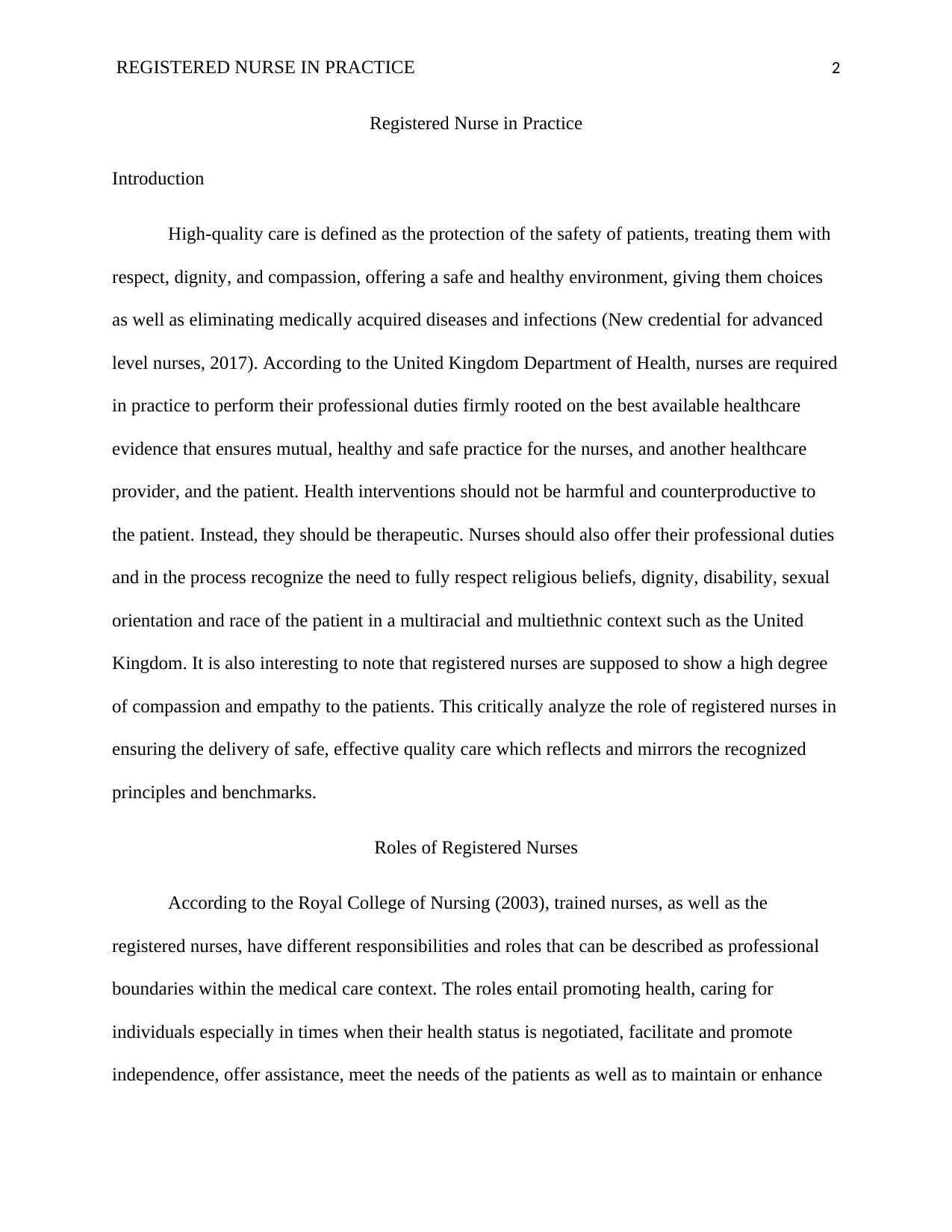
REGISTERED NURSE IN PRACTICE 2
Registered Nurse in Practice
Introduction
High-quality care is defined as the protection of the safety of patients, treating them with
respect, dignity, and compassion, offering a safe and healthy environment, giving them choices
as well as eliminating medically acquired diseases and infections (New credential for advanced
level nurses, 2017). According to the United Kingdom Department of Health, nurses are required
in practice to perform their professional duties firmly rooted on the best available healthcare
evidence that ensures mutual, healthy and safe practice for the nurses, and another healthcare
provider, and the patient. Health interventions should not be harmful and counterproductive to
the patient. Instead, they should be therapeutic. Nurses should also offer their professional duties
and in the process recognize the need to fully respect religious beliefs, dignity, disability, sexual
orientation and race of the patient in a multiracial and multiethnic context such as the United
Kingdom. It is also interesting to note that registered nurses are supposed to show a high degree
of compassion and empathy to the patients. This critically analyze the role of registered nurses in
ensuring the delivery of safe, effective quality care which reflects and mirrors the recognized
principles and benchmarks.
Roles of Registered Nurses
According to the Royal College of Nursing (2003), trained nurses, as well as the
registered nurses, have different responsibilities and roles that can be described as professional
boundaries within the medical care context. The roles entail promoting health, caring for
individuals especially in times when their health status is negotiated, facilitate and promote
independence, offer assistance, meet the needs of the patients as well as to maintain or enhance
Registered Nurse in Practice
Introduction
High-quality care is defined as the protection of the safety of patients, treating them with
respect, dignity, and compassion, offering a safe and healthy environment, giving them choices
as well as eliminating medically acquired diseases and infections (New credential for advanced
level nurses, 2017). According to the United Kingdom Department of Health, nurses are required
in practice to perform their professional duties firmly rooted on the best available healthcare
evidence that ensures mutual, healthy and safe practice for the nurses, and another healthcare
provider, and the patient. Health interventions should not be harmful and counterproductive to
the patient. Instead, they should be therapeutic. Nurses should also offer their professional duties
and in the process recognize the need to fully respect religious beliefs, dignity, disability, sexual
orientation and race of the patient in a multiracial and multiethnic context such as the United
Kingdom. It is also interesting to note that registered nurses are supposed to show a high degree
of compassion and empathy to the patients. This critically analyze the role of registered nurses in
ensuring the delivery of safe, effective quality care which reflects and mirrors the recognized
principles and benchmarks.
Roles of Registered Nurses
According to the Royal College of Nursing (2003), trained nurses, as well as the
registered nurses, have different responsibilities and roles that can be described as professional
boundaries within the medical care context. The roles entail promoting health, caring for
individuals especially in times when their health status is negotiated, facilitate and promote
independence, offer assistance, meet the needs of the patients as well as to maintain or enhance
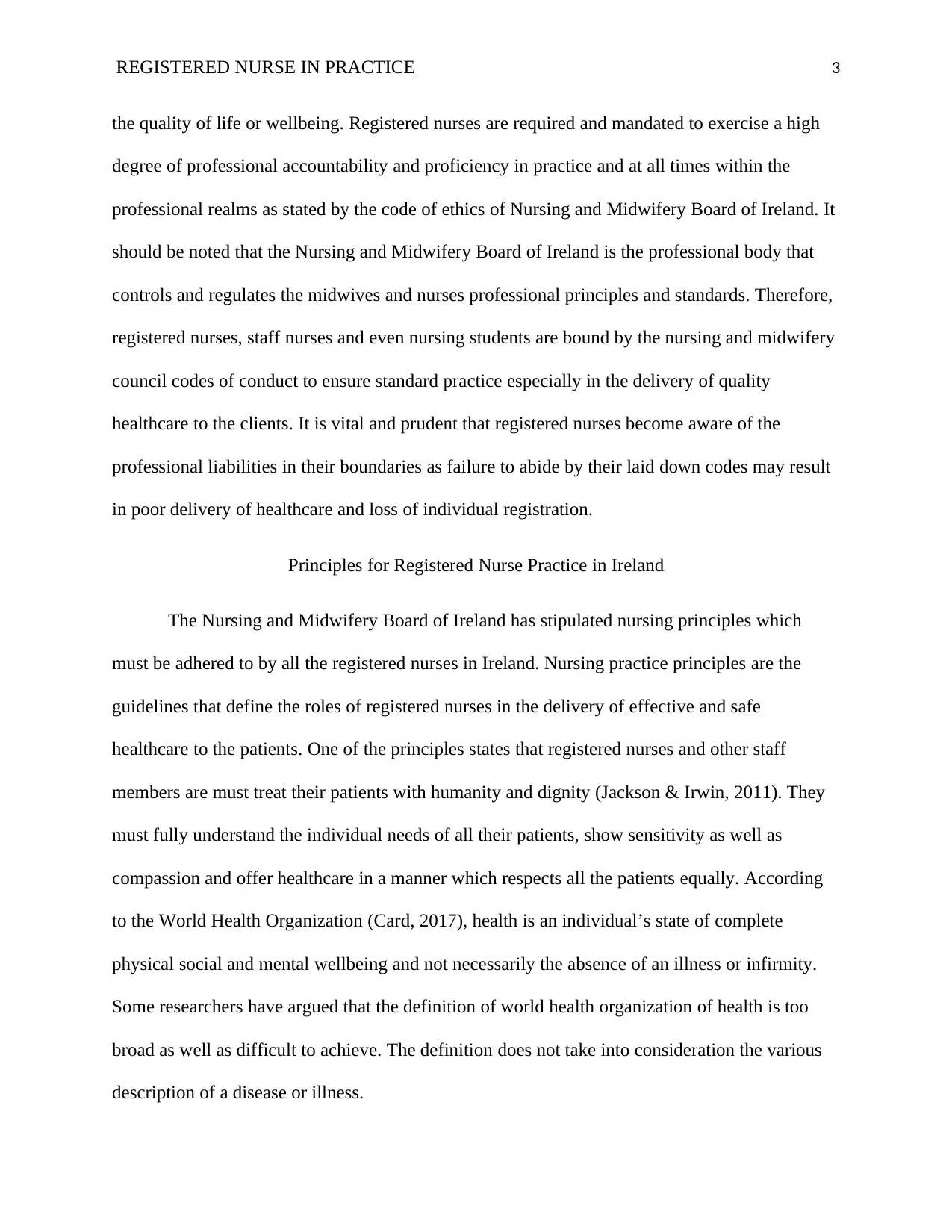
REGISTERED NURSE IN PRACTICE 3
the quality of life or wellbeing. Registered nurses are required and mandated to exercise a high
degree of professional accountability and proficiency in practice and at all times within the
professional realms as stated by the code of ethics of Nursing and Midwifery Board of Ireland. It
should be noted that the Nursing and Midwifery Board of Ireland is the professional body that
controls and regulates the midwives and nurses professional principles and standards. Therefore,
registered nurses, staff nurses and even nursing students are bound by the nursing and midwifery
council codes of conduct to ensure standard practice especially in the delivery of quality
healthcare to the clients. It is vital and prudent that registered nurses become aware of the
professional liabilities in their boundaries as failure to abide by their laid down codes may result
in poor delivery of healthcare and loss of individual registration.
Principles for Registered Nurse Practice in Ireland
The Nursing and Midwifery Board of Ireland has stipulated nursing principles which
must be adhered to by all the registered nurses in Ireland. Nursing practice principles are the
guidelines that define the roles of registered nurses in the delivery of effective and safe
healthcare to the patients. One of the principles states that registered nurses and other staff
members are must treat their patients with humanity and dignity (Jackson & Irwin, 2011). They
must fully understand the individual needs of all their patients, show sensitivity as well as
compassion and offer healthcare in a manner which respects all the patients equally. According
to the World Health Organization (Card, 2017), health is an individual’s state of complete
physical social and mental wellbeing and not necessarily the absence of an illness or infirmity.
Some researchers have argued that the definition of world health organization of health is too
broad as well as difficult to achieve. The definition does not take into consideration the various
description of a disease or illness.
the quality of life or wellbeing. Registered nurses are required and mandated to exercise a high
degree of professional accountability and proficiency in practice and at all times within the
professional realms as stated by the code of ethics of Nursing and Midwifery Board of Ireland. It
should be noted that the Nursing and Midwifery Board of Ireland is the professional body that
controls and regulates the midwives and nurses professional principles and standards. Therefore,
registered nurses, staff nurses and even nursing students are bound by the nursing and midwifery
council codes of conduct to ensure standard practice especially in the delivery of quality
healthcare to the clients. It is vital and prudent that registered nurses become aware of the
professional liabilities in their boundaries as failure to abide by their laid down codes may result
in poor delivery of healthcare and loss of individual registration.
Principles for Registered Nurse Practice in Ireland
The Nursing and Midwifery Board of Ireland has stipulated nursing principles which
must be adhered to by all the registered nurses in Ireland. Nursing practice principles are the
guidelines that define the roles of registered nurses in the delivery of effective and safe
healthcare to the patients. One of the principles states that registered nurses and other staff
members are must treat their patients with humanity and dignity (Jackson & Irwin, 2011). They
must fully understand the individual needs of all their patients, show sensitivity as well as
compassion and offer healthcare in a manner which respects all the patients equally. According
to the World Health Organization (Card, 2017), health is an individual’s state of complete
physical social and mental wellbeing and not necessarily the absence of an illness or infirmity.
Some researchers have argued that the definition of world health organization of health is too
broad as well as difficult to achieve. The definition does not take into consideration the various
description of a disease or illness.
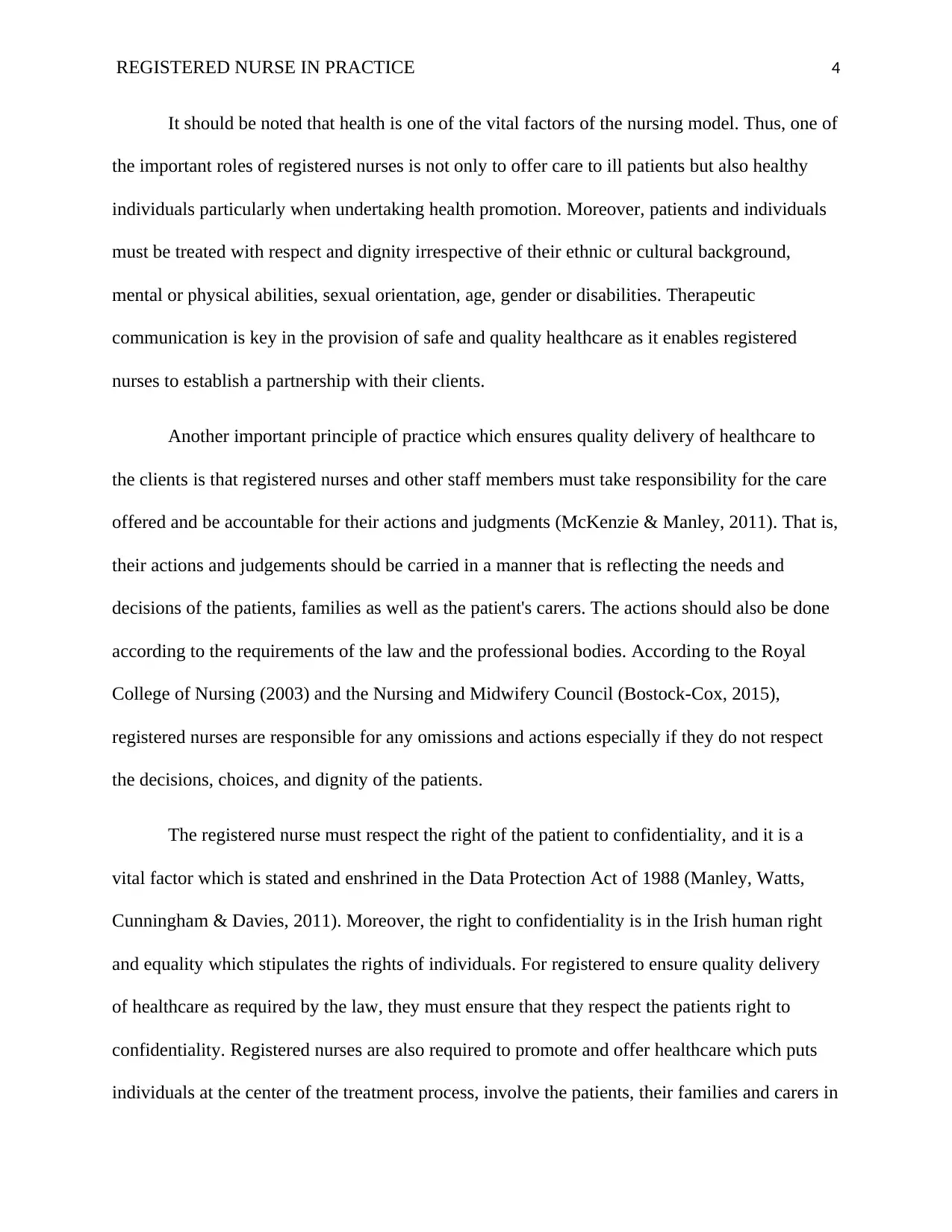
REGISTERED NURSE IN PRACTICE 4
It should be noted that health is one of the vital factors of the nursing model. Thus, one of
the important roles of registered nurses is not only to offer care to ill patients but also healthy
individuals particularly when undertaking health promotion. Moreover, patients and individuals
must be treated with respect and dignity irrespective of their ethnic or cultural background,
mental or physical abilities, sexual orientation, age, gender or disabilities. Therapeutic
communication is key in the provision of safe and quality healthcare as it enables registered
nurses to establish a partnership with their clients.
Another important principle of practice which ensures quality delivery of healthcare to
the clients is that registered nurses and other staff members must take responsibility for the care
offered and be accountable for their actions and judgments (McKenzie & Manley, 2011). That is,
their actions and judgements should be carried in a manner that is reflecting the needs and
decisions of the patients, families as well as the patient's carers. The actions should also be done
according to the requirements of the law and the professional bodies. According to the Royal
College of Nursing (2003) and the Nursing and Midwifery Council (Bostock-Cox, 2015),
registered nurses are responsible for any omissions and actions especially if they do not respect
the decisions, choices, and dignity of the patients.
The registered nurse must respect the right of the patient to confidentiality, and it is a
vital factor which is stated and enshrined in the Data Protection Act of 1988 (Manley, Watts,
Cunningham & Davies, 2011). Moreover, the right to confidentiality is in the Irish human right
and equality which stipulates the rights of individuals. For registered to ensure quality delivery
of healthcare as required by the law, they must ensure that they respect the patients right to
confidentiality. Registered nurses are also required to promote and offer healthcare which puts
individuals at the center of the treatment process, involve the patients, their families and carers in
It should be noted that health is one of the vital factors of the nursing model. Thus, one of
the important roles of registered nurses is not only to offer care to ill patients but also healthy
individuals particularly when undertaking health promotion. Moreover, patients and individuals
must be treated with respect and dignity irrespective of their ethnic or cultural background,
mental or physical abilities, sexual orientation, age, gender or disabilities. Therapeutic
communication is key in the provision of safe and quality healthcare as it enables registered
nurses to establish a partnership with their clients.
Another important principle of practice which ensures quality delivery of healthcare to
the clients is that registered nurses and other staff members must take responsibility for the care
offered and be accountable for their actions and judgments (McKenzie & Manley, 2011). That is,
their actions and judgements should be carried in a manner that is reflecting the needs and
decisions of the patients, families as well as the patient's carers. The actions should also be done
according to the requirements of the law and the professional bodies. According to the Royal
College of Nursing (2003) and the Nursing and Midwifery Council (Bostock-Cox, 2015),
registered nurses are responsible for any omissions and actions especially if they do not respect
the decisions, choices, and dignity of the patients.
The registered nurse must respect the right of the patient to confidentiality, and it is a
vital factor which is stated and enshrined in the Data Protection Act of 1988 (Manley, Watts,
Cunningham & Davies, 2011). Moreover, the right to confidentiality is in the Irish human right
and equality which stipulates the rights of individuals. For registered to ensure quality delivery
of healthcare as required by the law, they must ensure that they respect the patients right to
confidentiality. Registered nurses are also required to promote and offer healthcare which puts
individuals at the center of the treatment process, involve the patients, their families and carers in
Paraphrase This Document
Need a fresh take? Get an instant paraphrase of this document with our AI Paraphraser
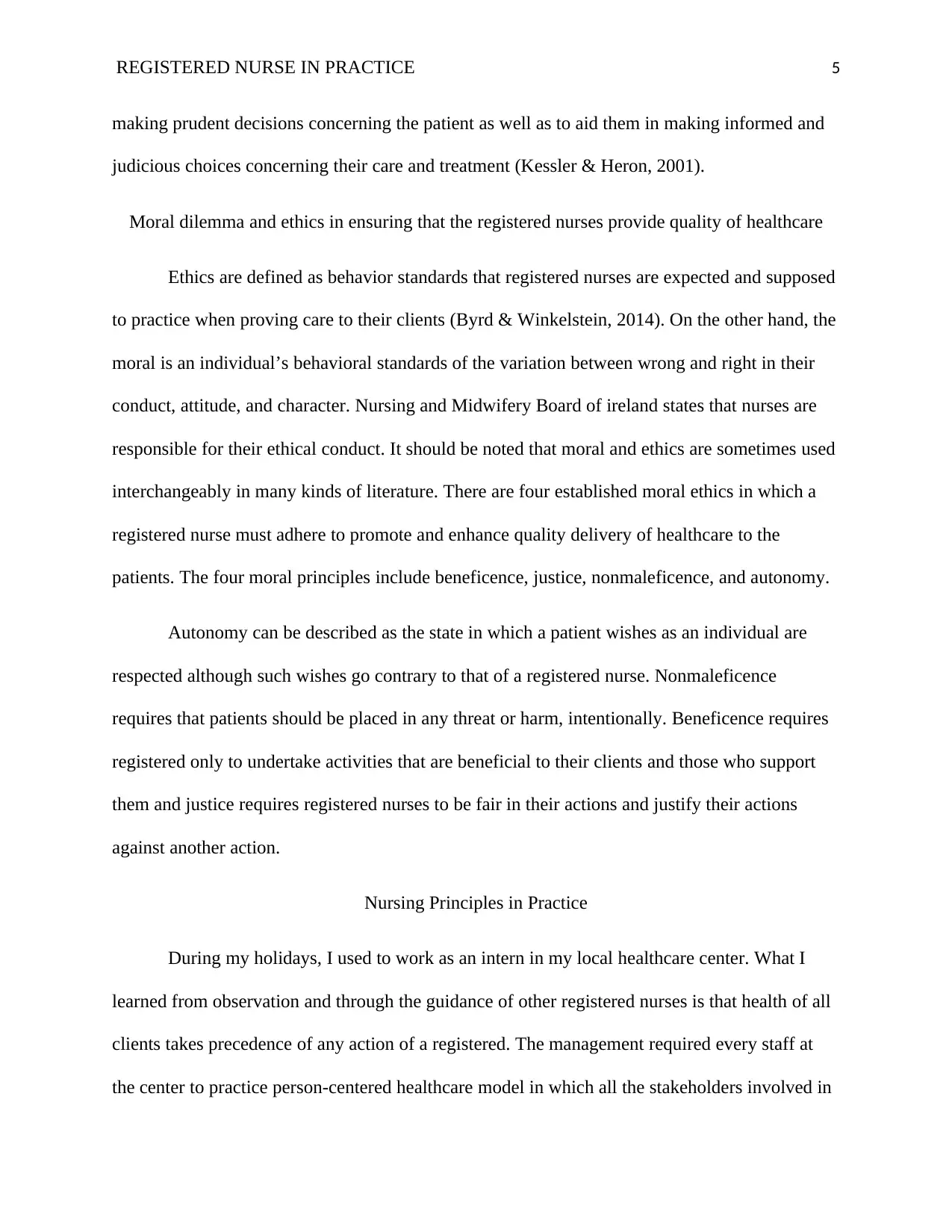
REGISTERED NURSE IN PRACTICE 5
making prudent decisions concerning the patient as well as to aid them in making informed and
judicious choices concerning their care and treatment (Kessler & Heron, 2001).
Moral dilemma and ethics in ensuring that the registered nurses provide quality of healthcare
Ethics are defined as behavior standards that registered nurses are expected and supposed
to practice when proving care to their clients (Byrd & Winkelstein, 2014). On the other hand, the
moral is an individual’s behavioral standards of the variation between wrong and right in their
conduct, attitude, and character. Nursing and Midwifery Board of ireland states that nurses are
responsible for their ethical conduct. It should be noted that moral and ethics are sometimes used
interchangeably in many kinds of literature. There are four established moral ethics in which a
registered nurse must adhere to promote and enhance quality delivery of healthcare to the
patients. The four moral principles include beneficence, justice, nonmaleficence, and autonomy.
Autonomy can be described as the state in which a patient wishes as an individual are
respected although such wishes go contrary to that of a registered nurse. Nonmaleficence
requires that patients should be placed in any threat or harm, intentionally. Beneficence requires
registered only to undertake activities that are beneficial to their clients and those who support
them and justice requires registered nurses to be fair in their actions and justify their actions
against another action.
Nursing Principles in Practice
During my holidays, I used to work as an intern in my local healthcare center. What I
learned from observation and through the guidance of other registered nurses is that health of all
clients takes precedence of any action of a registered. The management required every staff at
the center to practice person-centered healthcare model in which all the stakeholders involved in
making prudent decisions concerning the patient as well as to aid them in making informed and
judicious choices concerning their care and treatment (Kessler & Heron, 2001).
Moral dilemma and ethics in ensuring that the registered nurses provide quality of healthcare
Ethics are defined as behavior standards that registered nurses are expected and supposed
to practice when proving care to their clients (Byrd & Winkelstein, 2014). On the other hand, the
moral is an individual’s behavioral standards of the variation between wrong and right in their
conduct, attitude, and character. Nursing and Midwifery Board of ireland states that nurses are
responsible for their ethical conduct. It should be noted that moral and ethics are sometimes used
interchangeably in many kinds of literature. There are four established moral ethics in which a
registered nurse must adhere to promote and enhance quality delivery of healthcare to the
patients. The four moral principles include beneficence, justice, nonmaleficence, and autonomy.
Autonomy can be described as the state in which a patient wishes as an individual are
respected although such wishes go contrary to that of a registered nurse. Nonmaleficence
requires that patients should be placed in any threat or harm, intentionally. Beneficence requires
registered only to undertake activities that are beneficial to their clients and those who support
them and justice requires registered nurses to be fair in their actions and justify their actions
against another action.
Nursing Principles in Practice
During my holidays, I used to work as an intern in my local healthcare center. What I
learned from observation and through the guidance of other registered nurses is that health of all
clients takes precedence of any action of a registered. The management required every staff at
the center to practice person-centered healthcare model in which all the stakeholders involved in
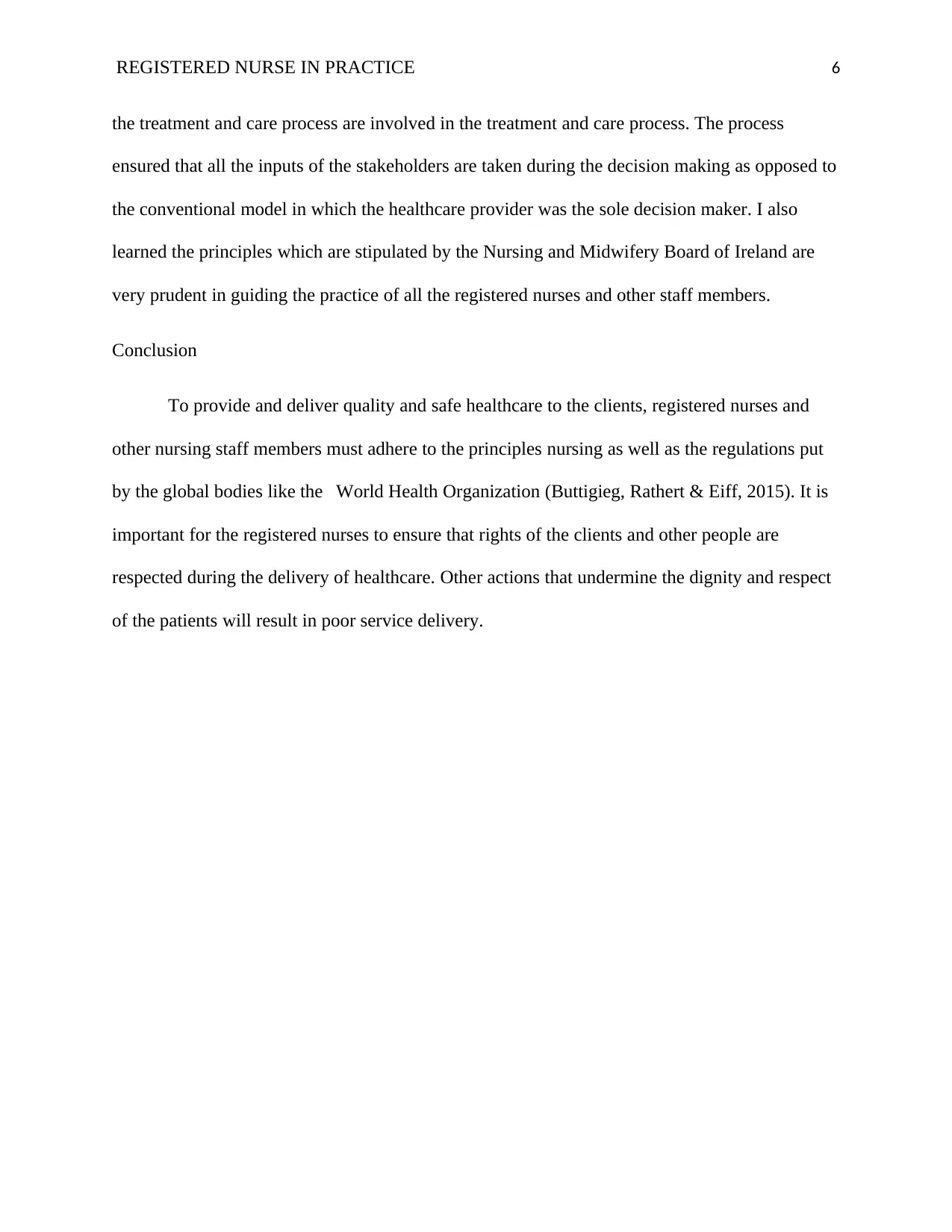
REGISTERED NURSE IN PRACTICE 6
the treatment and care process are involved in the treatment and care process. The process
ensured that all the inputs of the stakeholders are taken during the decision making as opposed to
the conventional model in which the healthcare provider was the sole decision maker. I also
learned the principles which are stipulated by the Nursing and Midwifery Board of Ireland are
very prudent in guiding the practice of all the registered nurses and other staff members.
Conclusion
To provide and deliver quality and safe healthcare to the clients, registered nurses and
other nursing staff members must adhere to the principles nursing as well as the regulations put
by the global bodies like the World Health Organization (Buttigieg, Rathert & Eiff, 2015). It is
important for the registered nurses to ensure that rights of the clients and other people are
respected during the delivery of healthcare. Other actions that undermine the dignity and respect
of the patients will result in poor service delivery.
the treatment and care process are involved in the treatment and care process. The process
ensured that all the inputs of the stakeholders are taken during the decision making as opposed to
the conventional model in which the healthcare provider was the sole decision maker. I also
learned the principles which are stipulated by the Nursing and Midwifery Board of Ireland are
very prudent in guiding the practice of all the registered nurses and other staff members.
Conclusion
To provide and deliver quality and safe healthcare to the clients, registered nurses and
other nursing staff members must adhere to the principles nursing as well as the regulations put
by the global bodies like the World Health Organization (Buttigieg, Rathert & Eiff, 2015). It is
important for the registered nurses to ensure that rights of the clients and other people are
respected during the delivery of healthcare. Other actions that undermine the dignity and respect
of the patients will result in poor service delivery.
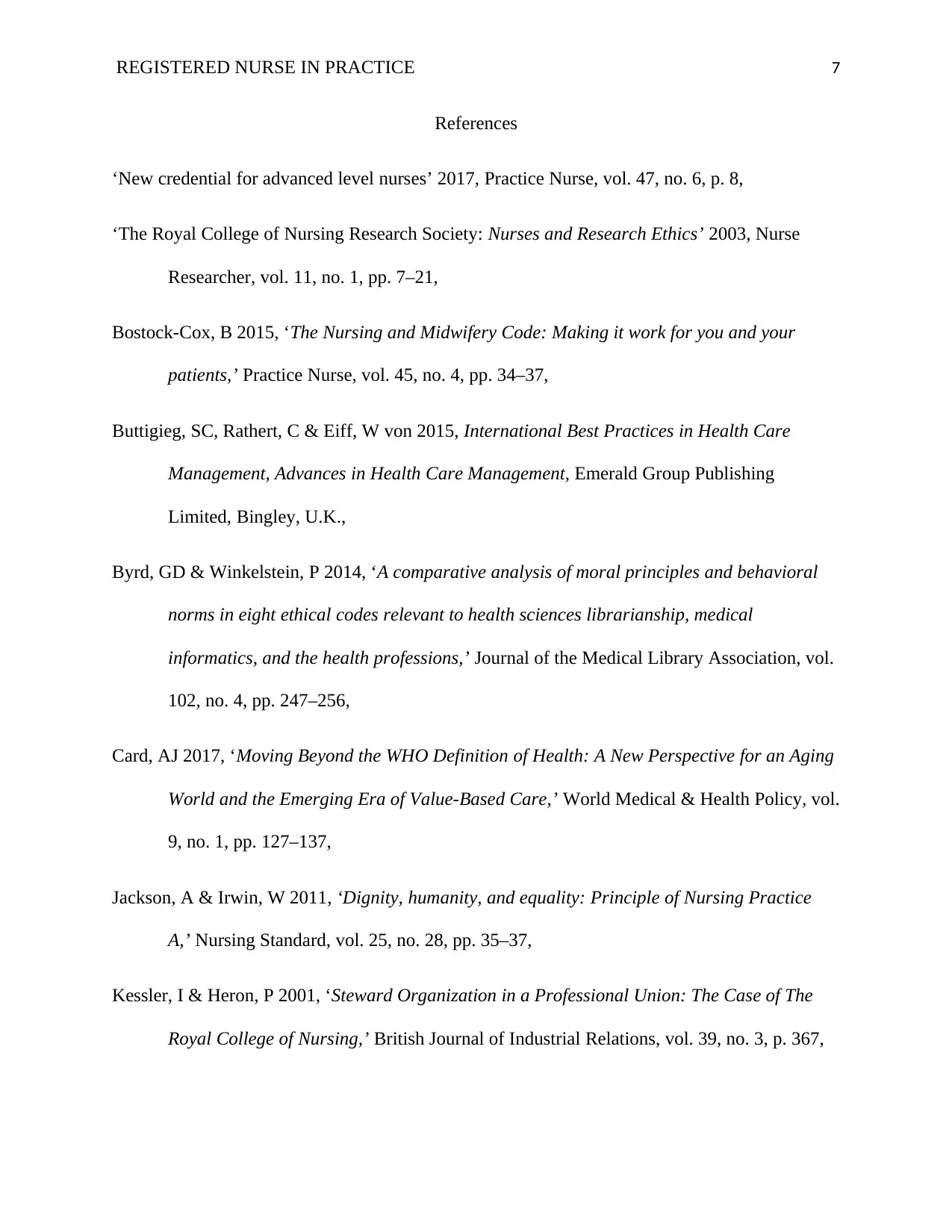
REGISTERED NURSE IN PRACTICE 7
References
‘New credential for advanced level nurses’ 2017, Practice Nurse, vol. 47, no. 6, p. 8,
‘The Royal College of Nursing Research Society: Nurses and Research Ethics’ 2003, Nurse
Researcher, vol. 11, no. 1, pp. 7–21,
Bostock-Cox, B 2015, ‘The Nursing and Midwifery Code: Making it work for you and your
patients,’ Practice Nurse, vol. 45, no. 4, pp. 34–37,
Buttigieg, SC, Rathert, C & Eiff, W von 2015, International Best Practices in Health Care
Management, Advances in Health Care Management, Emerald Group Publishing
Limited, Bingley, U.K.,
Byrd, GD & Winkelstein, P 2014, ‘A comparative analysis of moral principles and behavioral
norms in eight ethical codes relevant to health sciences librarianship, medical
informatics, and the health professions,’ Journal of the Medical Library Association, vol.
102, no. 4, pp. 247–256,
Card, AJ 2017, ‘Moving Beyond the WHO Definition of Health: A New Perspective for an Aging
World and the Emerging Era of Value-Based Care,’ World Medical & Health Policy, vol.
9, no. 1, pp. 127–137,
Jackson, A & Irwin, W 2011, ‘Dignity, humanity, and equality: Principle of Nursing Practice
A,’ Nursing Standard, vol. 25, no. 28, pp. 35–37,
Kessler, I & Heron, P 2001, ‘Steward Organization in a Professional Union: The Case of The
Royal College of Nursing,’ British Journal of Industrial Relations, vol. 39, no. 3, p. 367,
References
‘New credential for advanced level nurses’ 2017, Practice Nurse, vol. 47, no. 6, p. 8,
‘The Royal College of Nursing Research Society: Nurses and Research Ethics’ 2003, Nurse
Researcher, vol. 11, no. 1, pp. 7–21,
Bostock-Cox, B 2015, ‘The Nursing and Midwifery Code: Making it work for you and your
patients,’ Practice Nurse, vol. 45, no. 4, pp. 34–37,
Buttigieg, SC, Rathert, C & Eiff, W von 2015, International Best Practices in Health Care
Management, Advances in Health Care Management, Emerald Group Publishing
Limited, Bingley, U.K.,
Byrd, GD & Winkelstein, P 2014, ‘A comparative analysis of moral principles and behavioral
norms in eight ethical codes relevant to health sciences librarianship, medical
informatics, and the health professions,’ Journal of the Medical Library Association, vol.
102, no. 4, pp. 247–256,
Card, AJ 2017, ‘Moving Beyond the WHO Definition of Health: A New Perspective for an Aging
World and the Emerging Era of Value-Based Care,’ World Medical & Health Policy, vol.
9, no. 1, pp. 127–137,
Jackson, A & Irwin, W 2011, ‘Dignity, humanity, and equality: Principle of Nursing Practice
A,’ Nursing Standard, vol. 25, no. 28, pp. 35–37,
Kessler, I & Heron, P 2001, ‘Steward Organization in a Professional Union: The Case of The
Royal College of Nursing,’ British Journal of Industrial Relations, vol. 39, no. 3, p. 367,
Secure Best Marks with AI Grader
Need help grading? Try our AI Grader for instant feedback on your assignments.
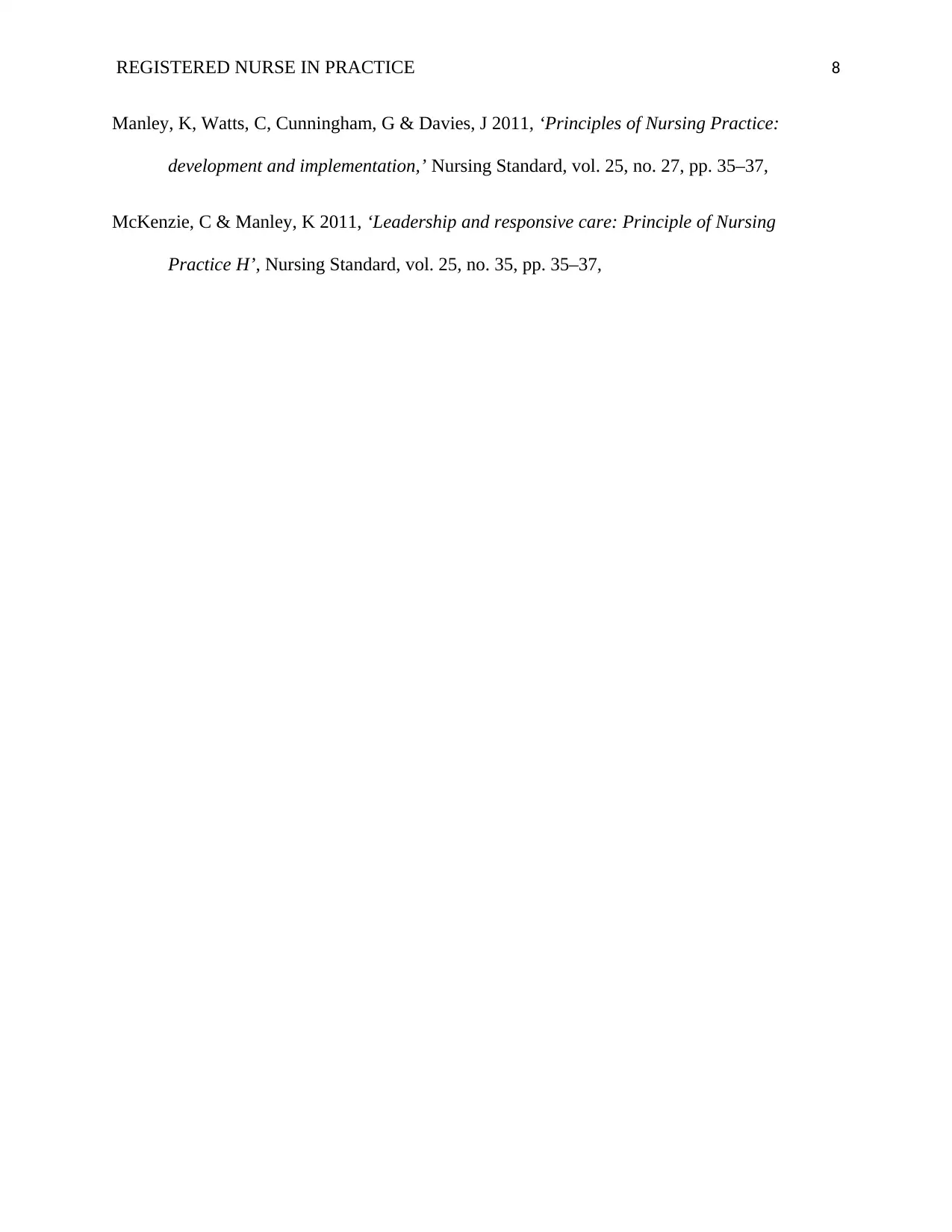
REGISTERED NURSE IN PRACTICE 8
Manley, K, Watts, C, Cunningham, G & Davies, J 2011, ‘Principles of Nursing Practice:
development and implementation,’ Nursing Standard, vol. 25, no. 27, pp. 35–37,
McKenzie, C & Manley, K 2011, ‘Leadership and responsive care: Principle of Nursing
Practice H’, Nursing Standard, vol. 25, no. 35, pp. 35–37,
Manley, K, Watts, C, Cunningham, G & Davies, J 2011, ‘Principles of Nursing Practice:
development and implementation,’ Nursing Standard, vol. 25, no. 27, pp. 35–37,
McKenzie, C & Manley, K 2011, ‘Leadership and responsive care: Principle of Nursing
Practice H’, Nursing Standard, vol. 25, no. 35, pp. 35–37,
1 out of 8
Related Documents
Your All-in-One AI-Powered Toolkit for Academic Success.
+13062052269
info@desklib.com
Available 24*7 on WhatsApp / Email
![[object Object]](/_next/static/media/star-bottom.7253800d.svg)
Unlock your academic potential
© 2024 | Zucol Services PVT LTD | All rights reserved.





